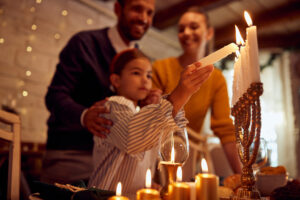Navigating the Holidays: How to Help Children as a Caregiver or Foster Parent

From classic holiday movies to festive carols, the media usually portrays the holiday season as the most wonderful time of the year, filled with family traditions and precious memories. But for many, that’s not the reality. Because this time of year places such an emphasis on family and celebration, it can be a difficult time for those who are separated from their loved ones through loss or intervention. Foster parents and caregivers can meaningfully support kids during the holidays.
At KVC Health Systems, we recognize how difficult this time of year can be for children in foster care and want to help caregivers and children experience the joy of the season. It’s important to be extra sensitive and attentive to children in your care during this festive season. It’s helpful to find ways to make new memories while honoring the celebrations the children love. Let’s explore several strategies for caregivers to help children navigate the holidays.
How Can the Holidays Be a Difficult Time for Children and Caregivers?
“The purpose of the holidays is to gather, connect and celebrate,” says Andrew Farmer, Trainer for Licensed Professional Staff at KVC Health Systems. When children are separated from their biological family members during the holidays, it can be easy for them to feel isolated and lonely, lacking the familiar connection of years past. As the caregiver, you may want to include the child in your own family’s traditions. But this can make them feel even more isolated if those traditions differ vastly from what the child knows and loves.
Recognizing Emotions of Loss During the Holidays
Children spending the holidays away from their biological family may experience feelings of loss or grief. This is caused by the changes in their normal routines and familiar experiences. The holiday season makes this change even more evident, and children may feel and express a variety of emotions. Here are a few changes caregivers may notice in a child’s behavior that could stem from grief around the holidays:
- Anger and outbursts
- Throwing fits
- Loss of appetite
- Anxiety
- Withdrawing or isolating
- Rebelling
There are many difficulties for children in foster care that go beyond holiday-related emotions. Children who have been separated from their loved ones are processing many big emotions that are only  heightened during the holidays. This can include feeling a loss of control, grieving the absence of family and normalcy and missing a sense of safety (or what a child has previously perceived as safety).
heightened during the holidays. This can include feeling a loss of control, grieving the absence of family and normalcy and missing a sense of safety (or what a child has previously perceived as safety).
Farmer explains that, for children in foster care, “New experiences can be perceived as a threat.” A child might be in a very physically safe and comfortable new environment, but still feel discomfort because it’s unfamiliar. Caregivers should try to practice grace. Asking what might help a child feel more secure and confident in their current situation can be a proactive approach to help children navigate the holidays.
How Can Caregivers Proactively Prepare to Support Kids During the Holidays?
Each year the holiday season is upon us before we even know it. With the increasing hustle and bustle of preparing for gatherings, gift-giving and celebrations, we can forget to nourish our need for self-care and foster real connections. This can happen with children too, especially those navigating the world of foster care.
Adjusting to so many new changes and unfamiliar experiences can quickly become overwhelming for children to manage. If a caregiver notices a child struggling, they should consider what they can do to support them and help them process their emotions. “Giving gifts is one thing,” shares Farmer, “but what can we do that promotes connection?” This question encourages us to focus on the bonding and togetherness that so many of us need—children and caregivers included!—especially during difficult times.
Here are a few ways caregivers can proactively prepare themselves and the children in their care to navigate the holidays.
 Ask Children About Their Traditions
Ask Children About Their Traditions
Seek to learn what a normal holiday celebration looks like for the child in your care. Then try to find ways to incorporate some of those traditions into holiday gatherings. It could be a treasured religious ritual like lighting a menorah, a favorite recipe they could help you make, or even a go-to movie they want to watch on Christmas Eve. Don’t pressure them to share if it feels too personal for them. But if they do open up about special holiday traditions then finding ways to change your own celebrations can help them feel more comfortable and safe.
Connect with Trusted Loved Ones
Have a list of trusted people the child can talk to like grandparents, aunts and uncles, siblings, cousins, teachers, coaches and even close family friends. Help the child in your care to connect with these loved ones through phone calls or even in-person meet-ups when safe and approved by the child’s social worker.
Be Affirming
Remind children that they are courageous, especially when they feel vulnerable. Courage is more than just bravery: it is also vulnerability, honesty and openness. Let the child know that they are safe and can share their feelings with you when difficulties arise. Caregivers can also cultivate an environment of trust by having open and transparent conversations with the children in their care.
Give the Gift of Presence
Spend quality time interacting with children in your care. They don’t need constant attention to feel connected and loved. But a few minutes of uninterrupted quality time each day can make a big impact, as can making yourself available as much as possible when they need you.
Seek Professional Help
A mental and behavioral health professional can provide excellent guidance for caregivers. They can coach caregivers on how to positively respond to children having a hard time adjusting during this season and provide resources to help children navigate the holidays.
What Can Caregivers Do If They Need Help Around the Holidays?
The holiday season is busy and overwhelming enough, and caregivers often feel this even more significantly. For those in foster care, the usual holiday rush is accompanied by extra appointments, family visits and many emotional challenges. The additional load can seem daunting, but an adjustment in perspective can go a long way.
Farmer says, “If caregivers can approach the holiday with the attitude that this is what they want — they want to help support a child through a difficult time — then there’s a better chance that they’ll have more patience and willingness to be attentive.”
Caregivers have very full hearts and want to give so much of themselves, which means they often forget that they also can get worn down and need support during difficult seasons. To help prevent exhaustion, caregivers should schedule time for self-care and interactions with other loved ones to refresh and recharge.
If it’s already the middle of the season and feelings of being overwhelmed or burned out arise, remember that it’s okay to take some time for yourself. Here are a few suggestions for taking a well-deserved mental health break as a caregiver:
- Write in a gratitude journal
- Spend one-on-one time with a loved one
- Go for an afternoon walk by yourself
- Exercise and move your body
- Talk to a therapist
Despite preparations for the holiday season as a caregiver, these ideas may not cut it. KVC offers many additional caregiver resources for loving and dedicated individuals that provide a safe space for children in need, including respite care for when some time apart is necessary.
If you’re considering opening your home to a child in need this holiday season, explore the foster care services offered through KVC and contact us to find out how you can get involved.







